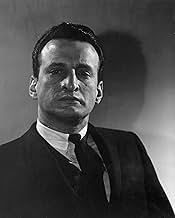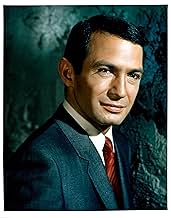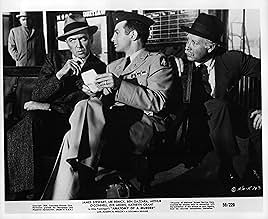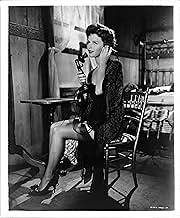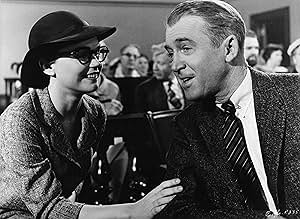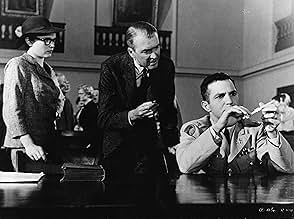Em um julgamento de assassinato, o réu disse que sofreu insanidade temporária depois que a vítima estuprou sua esposa. Qual é a verdade e ele vai ganhar o caso?Em um julgamento de assassinato, o réu disse que sofreu insanidade temporária depois que a vítima estuprou sua esposa. Qual é a verdade e ele vai ganhar o caso?Em um julgamento de assassinato, o réu disse que sofreu insanidade temporária depois que a vítima estuprou sua esposa. Qual é a verdade e ele vai ganhar o caso?
- Direção
- Roteiristas
- Artistas
- Indicado a 7 Oscars
- 10 vitórias e 18 indicações no total
- Direção
- Roteiristas
- Elenco e equipe completos
- Produção, bilheteria e muito mais no IMDbPro
Avaliações em destaque
Well filmed, beautifully acted, and painstakingly directed, this film deserves the highest praise.
James Stewart brings his customary stammering, quirky charm to a role that could have easily become overwhelmingly serious. Lee Remick is seen establishing her early image as the somehow fragile, undeniably seductive pawn (see also "A Face in The Crowd"), while Gazzara wavers intensely somewhere between heartless murderer and protective husband. The supporting cast is strong, creating a human backdrop for the senior players, keeping the story in the real world, effectively preventing this from becoming an exercise in legal theory.
This film is noteworthy for a myriad of reasons, but most specifically because it addresses the still controversial issue of acquaintance rape, and presents us with a victim of questionable morals. At the same time our murder victim is seen as a monster, then a friend and father. There really are no heroes here, no noble defenders, no pristine heroines, no completely innocent bystanders...both sides take their turns pointing fingers, each claiming that the other only got what they deserved.
We are forced to re-evaluate our thoughts on what constitutes justifiable homicide--the unwritten law that Manion speaks of in the film versus the law as written that Biegler must now interpret. This manipulation of intended meaning sets a somewhat tragic precedent evident in the legal system we work within today.
This film is highly entertaining, and excellent for discussion. Watch it with some of your more philosophical friends.
James Stewart brings his customary stammering, quirky charm to a role that could have easily become overwhelmingly serious. Lee Remick is seen establishing her early image as the somehow fragile, undeniably seductive pawn (see also "A Face in The Crowd"), while Gazzara wavers intensely somewhere between heartless murderer and protective husband. The supporting cast is strong, creating a human backdrop for the senior players, keeping the story in the real world, effectively preventing this from becoming an exercise in legal theory.
This film is noteworthy for a myriad of reasons, but most specifically because it addresses the still controversial issue of acquaintance rape, and presents us with a victim of questionable morals. At the same time our murder victim is seen as a monster, then a friend and father. There really are no heroes here, no noble defenders, no pristine heroines, no completely innocent bystanders...both sides take their turns pointing fingers, each claiming that the other only got what they deserved.
We are forced to re-evaluate our thoughts on what constitutes justifiable homicide--the unwritten law that Manion speaks of in the film versus the law as written that Biegler must now interpret. This manipulation of intended meaning sets a somewhat tragic precedent evident in the legal system we work within today.
This film is highly entertaining, and excellent for discussion. Watch it with some of your more philosophical friends.
Lawyer Paul Biegler takes the case of Lt. Manion who killed a man after he discovered he had raped his wife, Laura. Biegler realises that the cards are not all in his favour and begins to ensure that the facts are spun in his favour as much as possible during the trial.
This film caused a stir back when it was released supposedly over the dialogue that contained words not used before in a motion picture. However it was more likely that the furore was over the cynical view of the legal profession that the film has. The story is good, but if you're looking for a John Grisham type film with shouting and ridiculous twists in the final reel then you're in the wrong place. What we have here is a clever, interesting story that moves slowly focusing on Biegler rather than twists and turns in the actual plot.
Biegler is sort of clean cut, but he seems like a real lawyer he twists facts and prompts lies in order to improve his case. The various tricks and theatrical shenanigans during the trail are also well observed. The characters are all interesting with only the judge seeming like a dull stereotype.
James Stewart is excellent and helps make the shifty lawyer more likeable and relatable. Remick is excellent as the flirtatious Laura while Gazzara is cool as the accused. George C Scott doesn't have much to do, but does well anyway.
Overall a very enjoyable courtroom thriller it lacks the fireworks of modern legal dramas but has a nice cynical edge to it that shows it isn't as in awe of the law as Grisham is.
This film caused a stir back when it was released supposedly over the dialogue that contained words not used before in a motion picture. However it was more likely that the furore was over the cynical view of the legal profession that the film has. The story is good, but if you're looking for a John Grisham type film with shouting and ridiculous twists in the final reel then you're in the wrong place. What we have here is a clever, interesting story that moves slowly focusing on Biegler rather than twists and turns in the actual plot.
Biegler is sort of clean cut, but he seems like a real lawyer he twists facts and prompts lies in order to improve his case. The various tricks and theatrical shenanigans during the trail are also well observed. The characters are all interesting with only the judge seeming like a dull stereotype.
James Stewart is excellent and helps make the shifty lawyer more likeable and relatable. Remick is excellent as the flirtatious Laura while Gazzara is cool as the accused. George C Scott doesn't have much to do, but does well anyway.
Overall a very enjoyable courtroom thriller it lacks the fireworks of modern legal dramas but has a nice cynical edge to it that shows it isn't as in awe of the law as Grisham is.
The legendary James Stewart has worked for several of Hollywood's most legendary directors including Frank Capra and Alfred Hitchcock but his films for them can not reach the level of this 1959 Columbia Pictures release that he did for Otto Preminger. Stewart gives his all time greatest performance in a gem of a courtroom drama that is often overlooked. Released on the heels of several other courtroom drama classics such as "Twelve Angry Men" and "Witness For The Prosecution", "Anatomy Of A Murder" tells the story of a small town Michigan lawyer (Stewart) who takes on the case of an army officer who is standing trial for murdering a man who he believes had raped his wife. A little risque and controversial for its time but still a classic and time has served it well. A triumph for all of the talent involved.
Based on the famous Traver novel, ANATOMY OF A MURDER is an extremely complex film that defeats easy definition. In some respects it is a social document of the era in which it was made; primarily, however, it is a detailed portrait of the law at work and the mechanizations and motivations of the individuals involved in a seemingly straight-forward case. In the process it raises certain ethical issues re attorney behavior and the lengths to which an attorney might go to win a case.
Paul Biegler (James Stewart) is a small-town lawyer who has recently lost a re-election for the position of District Attorney and who is down on his luck--when a headline-making case involving assault, alleged rape, and murder drops into his lap. As the case evolves, there is no question about the identity of the killer. But a smart lawyer might be able to get him off just the same and redeem his own career in the process, and with the aid of an old friend (Arthur O'Connell) and his formidable secretary (Eve Arden), Biegler sets out to do precisely that. Opposing him in the courtroom is Claude Dancer (George C. Scott), a high powered prosecutor who is equally determined to get a conviction... and who is no more adverse to coaching a witness than Biegler himself. The two square off in a constantly shifting battle for the jury, a battle that often consists of underhanded tactics on both sides.
The performances are impressive, with James Stewart ideally cast as the attorney for the defense, Ben Gazzara as his unsavory client, and a truly brilliant Lee Remick as the sexy and disreputable wife who screams rape where just possibly none occurred; O'Connell, Arden, and Scott also offer superior performances. The script is sharp, cool, and meticulous, the direction and cinematography both effective and completely unobtrusive, and the famous jazz score adds quite a bit to the film as a whole.
Although we can't help rooting for Stewart, as the film progresses it seems more and more likely that Remick is lying through her teeth and Gazzara is as guilty as sin--but the film balances its elements in such a way as to achieve a disturbing ambiguity that continues right through to the end. If you expect a courtroom thriller with sudden revelations and twists you'll likely be disappointed in ANATOMY OF A MURDER, but if you want a thought-provoking take on the law you'd be hard pressed to find one better. Recommended.
Gary F. Taylor, aka GFT, Amazon Reviewer
Paul Biegler (James Stewart) is a small-town lawyer who has recently lost a re-election for the position of District Attorney and who is down on his luck--when a headline-making case involving assault, alleged rape, and murder drops into his lap. As the case evolves, there is no question about the identity of the killer. But a smart lawyer might be able to get him off just the same and redeem his own career in the process, and with the aid of an old friend (Arthur O'Connell) and his formidable secretary (Eve Arden), Biegler sets out to do precisely that. Opposing him in the courtroom is Claude Dancer (George C. Scott), a high powered prosecutor who is equally determined to get a conviction... and who is no more adverse to coaching a witness than Biegler himself. The two square off in a constantly shifting battle for the jury, a battle that often consists of underhanded tactics on both sides.
The performances are impressive, with James Stewart ideally cast as the attorney for the defense, Ben Gazzara as his unsavory client, and a truly brilliant Lee Remick as the sexy and disreputable wife who screams rape where just possibly none occurred; O'Connell, Arden, and Scott also offer superior performances. The script is sharp, cool, and meticulous, the direction and cinematography both effective and completely unobtrusive, and the famous jazz score adds quite a bit to the film as a whole.
Although we can't help rooting for Stewart, as the film progresses it seems more and more likely that Remick is lying through her teeth and Gazzara is as guilty as sin--but the film balances its elements in such a way as to achieve a disturbing ambiguity that continues right through to the end. If you expect a courtroom thriller with sudden revelations and twists you'll likely be disappointed in ANATOMY OF A MURDER, but if you want a thought-provoking take on the law you'd be hard pressed to find one better. Recommended.
Gary F. Taylor, aka GFT, Amazon Reviewer
As a courtroom drama, "Anatomy of a Murder" would be hard to surpass. It is a first-class production with an interesting and unpredictable story plus a strong cast. It works admirably, both as a story and as a portrayal of the workings of the law. It avoids the labored dramatics and contrived resolutions in which so many movies of the genre indulge, and it also declines to shy away from pointing out the more ill-conceived features of the legal system.
From his first scene, James Stewart pulls the viewer right into the world of lawyer Paul Biegler. It takes little time before you come to know him and to get a pretty good idea of what his life is like. His scenes with Arthur O'Connell work well in rounding out the picture. The two are neither heroic nor brilliant, but simply sympathetic and believable.
Into Biegler's world then come the characters played by Ben Gazzara and Lee Remick, a married couple with more than their share of faults. By making them less than ideal clients, the movie takes a chance on losing the audience's sympathy, but it adds credibility and complexity to the story. Both roles are played well - again, it seems as if you know a lot more about them than is specifically stated.
When George C. Scott enters the picture, he adds yet another dimension. His character arrives at just the right time to complicate the plot, and his legal skirmishing with Stewart makes some dry material come to life in an interesting way. Eve Arden also has some good moments, and her character is used in just the right amount to add some amusement without causing a distraction from the main story. It's also interesting to see Joseph Welch as the judge, and his portrayal works well enough.
Otto Preminger holds everything together nicely, with the right amount of detail and a pace that keeps the story moving steadily. The result is a very nice contrast to the many run-of-the mill legal/courtroom movies that present such an idealized view of the justice system. It maintains a careful balance, making clear the flaws and unpleasant realities of the system, yet never taking cheap shots either. And it's also an interesting and involved story, one of the most carefully-crafted of its kind.
From his first scene, James Stewart pulls the viewer right into the world of lawyer Paul Biegler. It takes little time before you come to know him and to get a pretty good idea of what his life is like. His scenes with Arthur O'Connell work well in rounding out the picture. The two are neither heroic nor brilliant, but simply sympathetic and believable.
Into Biegler's world then come the characters played by Ben Gazzara and Lee Remick, a married couple with more than their share of faults. By making them less than ideal clients, the movie takes a chance on losing the audience's sympathy, but it adds credibility and complexity to the story. Both roles are played well - again, it seems as if you know a lot more about them than is specifically stated.
When George C. Scott enters the picture, he adds yet another dimension. His character arrives at just the right time to complicate the plot, and his legal skirmishing with Stewart makes some dry material come to life in an interesting way. Eve Arden also has some good moments, and her character is used in just the right amount to add some amusement without causing a distraction from the main story. It's also interesting to see Joseph Welch as the judge, and his portrayal works well enough.
Otto Preminger holds everything together nicely, with the right amount of detail and a pace that keeps the story moving steadily. The result is a very nice contrast to the many run-of-the mill legal/courtroom movies that present such an idealized view of the justice system. It maintains a careful balance, making clear the flaws and unpleasant realities of the system, yet never taking cheap shots either. And it's also an interesting and involved story, one of the most carefully-crafted of its kind.
Você sabia?
- CuriosidadesPart of the controversy surrounding this movie was because it included use of the words "bitch", "contraceptive", "panties", "penetration", "rape", "slut", and "sperm".
- Erros de gravaçãoJames Stewart goes to negotiate with the DA at the courthouse. Sign over the DA's door is misspelled "Proseguting attorney". Actually this is not true. It's possible to compare the c with the g at the end of the word, and you can see the g has a descending stroke. It's just a foible of the font.
- Citações
Paul Biegler: As a lawyer, I've had to learn that people aren't just good or just bad. People are many things.
- ConexõesFeatured in Portrait of an Actor (1971)
Principais escolhas
Faça login para avaliar e ver a lista de recomendações personalizadas
Detalhes
- Data de lançamento
- País de origem
- Idioma
- Também conhecido como
- Anatomía de un asesinato
- Locações de filme
- Tripoli Bar, Ishpeming, Michigan, EUA(interiors: Thunder Bay Inn)
- Empresa de produção
- Consulte mais créditos da empresa na IMDbPro
Bilheteria
- Faturamento bruto mundial
- US$ 194
- Tempo de duração2 horas 41 minutos
- Cor
- Mixagem de som
- Proporção
- 1.85 : 1
Contribua para esta página
Sugerir uma alteração ou adicionar conteúdo ausente




